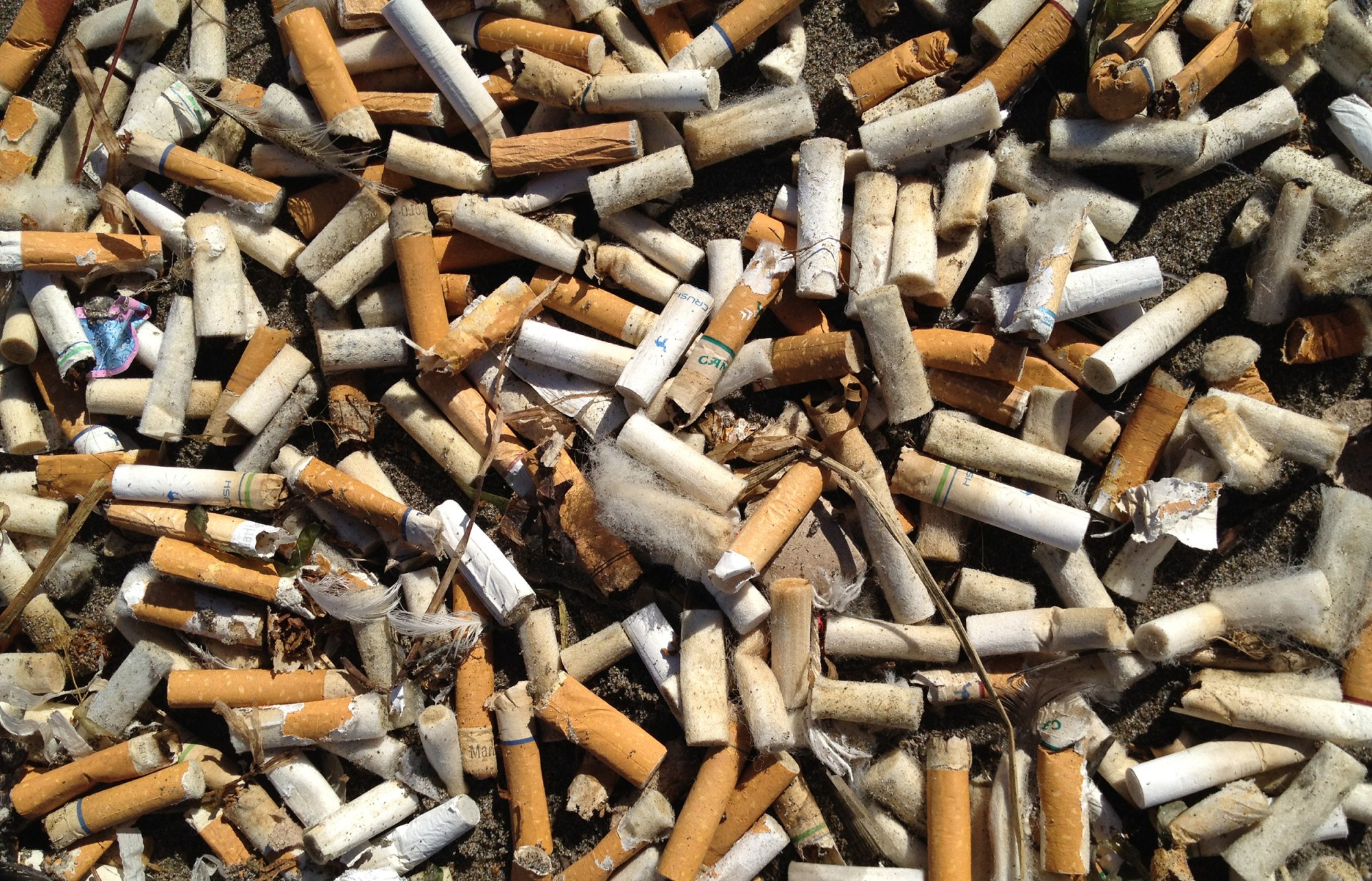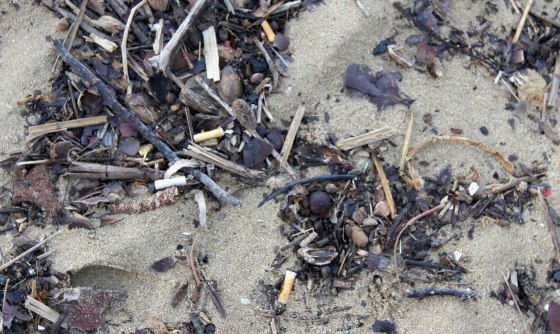270.000 cigarette butts - Barceloneta Beach, Barcelona Spain (07/07/2018)
Cigarette butts have long been the single most collected item on the world’s beaches, with a total of more than 60 million collected over 32 years.
Environmentalists have taken aim at the targets systematically, seeking to eliminate or rein in big sources of ocean pollution — first plastic bags, then eating utensils and, most recently, drinking straws.
More than a dozen coastal cities prohibited plastic straws this year.
Many more are pondering bans, along with the states of California and Hawaii.
Yet the No.
1 man-made contaminant in the world’s oceans is the small but ubiquitous cigarette butt — and it has mostly avoided regulation.
That soon could change, if a group of committed activists has its way.

Cigarette butts collected during the 2012 International Coastal Cleanup in Oregon.
Thomas Jones / Ocean Conservancy
A leading tobacco industry academic, a California lawmaker and a worldwide surfing organization are among those arguing cigarette filters should be banned.The nascent campaign hopes to be bolstered by linking activists focused on human health with those focused on the environment.
“It’s pretty clear there is no health benefit from filters.
They are just a marketing tool.
And they make it easier for people to smoke,” said Thomas Novotny, a professor of public health at San Diego State University.
“It’s also a major contaminant, with all that plastic waste.
It seems like a no-brainer to me that we can’t continue to allow this."
A California assemblyman proposed a ban on cigarettes with filters, but couldn’t get the proposal out of committee.
A New York state senator has written legislation to create a rebate for butts returned to redemption centers, though that idea also stalled.
San Francisco has made the biggest inroad — a 60-cent per pack fee to raise roughly $3 million a year to help defray the cost of cleaning up discarded cigarette filters.
'The most littered item in the world'
Cigarette butts have now also fallen into the sights of one of the nation’s biggest anti-smoking organizations, the Truth initiative.
The organization uses funds from a legal settlement between state attorneys general and tobacco companies to deliver tough messages against smoking.
The group last week used the nationally televised Video Music Awards to launch a new campaign against cigarette butts.
As in a couple of previous ads delivered via social media, the organization is going after “the most littered item in the world.”
It’s no wonder that cigarette butts have drawn attention.
The vast majority of the 5.6 trillion cigarettes manufactured worldwide each year come with filters made of cellulose acetate, a form of plastic that can take a decade or more to decompose.
As many as two-thirds of those filters are dumped irresponsibly each year, according to Novotny, who founded the Cigarette Butt Pollution Project.
The Ocean Conservancy has sponsored a beach cleanup every year since 1986.
For 32 consecutive years, cigarette butts have been the single most collected item on the world’s beaches, with a total of more than 60 million collected over that time.
That amounts to about one-third of all collected items and more than plastic wrappers, containers, bottle caps, eating utensils and bottles, combined.
People sometimes dump that trash directly on to beaches but, more often, it washes into the oceans from countless storm drains, streams and rivers around the world.
The waste often disintegrates into microplastics easily consumed by wildlife.
Researchers have found the detritus in some 70 percent of seabirds and 30 percent of sea turtles.
Those discarded filters usually contain synthetic fibers and hundreds of chemicals used to treat tobacco, said Novotny, who is pursuing further research into what kinds of cigarette waste leech into the soil, streams, rivers and oceans.
Plastic fibers threaten to foul the food chain
“More research is needed to determine exactly what happens to all of that,” said Nick Mallos, director of the Trash Free Seas campaign for the Ocean Conservancy.
“The final question is what impact these micro-plastics and other waste have on human health."
Cigarettes are the number 1 polluters on our beaches today.
courtesy of San Diego CoastKeeper
Tobacco companies initially explored the use of filters in the mid-20th century as a potential method for ameliorating spiraling concerns about the health impacts of tobacco.
But research suggested that smoke-bound carcinogens couldn’t be adequately controlled.
Then “filters became a marketing tool, designed to recruit and keep smokers as consumers of these hazardous products,” according to research by Bradford Harris, a graduate scholar in the history of science and technology at Stanford University.
Over the last two decades, the tobacco companies also feared being held responsible for mass cigarette litter, said Novotny.
Internal company documents show the industry considered everything from biodegradable filters, to anti-litter campaigns to mass distribution of portable and permanent ashtrays.
Industry giant R.J. Reynolds Tobacco Co. launched a “portable ashtray” campaign in 1991, distributing disposable pouches for butts in test marketing with its Vantage, Camel and Salem brands.
(A handy pocket behind the pouch was designed for storing matches, keys and loose change.) The company donated to the nationwide Keep America Beautiful anti-litter campaign and in 1992 it installed its own “Don’t Leave Your Butt on the Beach” billboards in 30 coastal cities.
More recently, an R.J. Reynolds subsidiary, Santa Fe Natural Tobacco Company, has launched a filter recycling effort, and the company mounts an intensive public awareness campaign about litter leading into Earth Day.
It also says it continues with the portable ashtray effort — distributing some four million pouches to customers this year.
Big tobacco tries, on occasion, to clean up its butts
A spokesman for Philip Morris USA, another big manufacturer, said admonitions on cigarette packs are part of a campaign that also includes installing trash receptacles, encouraging the use of portable ashtrays and support for enforcement of litter laws.
But academics who followed such campaigns said they encountered an essential problem: Most smokers preferred to flick their butts.
In industry focus groups, some smokers said they thought filters were biodegradable, possibly made of cotton; others said they needed to grind the butts out on the ground, to assure they didn’t set a refuse can afire; others said they were so “disgusted” by the sight or smell of cigarette ashtrays, they didn’t want to dispose of their smokes that way.
In one focus group cited in industry documents, smokers said tossing their butts to the ground was “a natural extension of the defiant/rebellious smoking ritual.”
“Their efforts — anti-litter campaigns and handheld and permanent ashtrays — did not substantially affect smokers' entrenched ‘butt flicking’ behaviors,” said a research paper co-authored by Novotny.
Cigarette butts found on a beach in Puerto Rico
during the 2010 International Coastal Cleanup.
Ocean Conservancy
That's left cities, counties and private groups like the Ocean Conservancy to bear the brunt of the cleanups.
There have been a few other quixotic solutions, like the French amusement park that recently trained a half dozens crows to collect spent cigarettes and other trash.
Cigarette companies on occasion have looked for alternatives.
Participants in one focus group gathered by R.J. Reynolds in the 1990s mused that the company might find a way to make edible filters, possibly of mint candy or crackers.
The industry looked for more practical solutions, including paper filters, but prototypes made the smoke taste harsh. And other materials, like cotton, were deemed to make a drag on a cigarette less satisfying.
Mervyn Witherspoon, a British chemist who once worked for the biggest independent maker of acetate filters, said the industry’s focus on finding a biodegradable filter “came and went, because there was never a pressure to do it.”
“We would work on it and find some solutions but the industry would find something more interesting to work on and it would go on the backburner again,” Witherspoon said.
“They are quite happy to sit tight until somebody leans on them to do something.”
A green alternative and an anti-butt coalition
Witherspoon is now working as a technical adviser to Greenbutts, a San Diego-based startup that says it has developed a filter made of organic materials that will quickly break down in soil or water.
The filters are composed of Manila hemp, tencel, wood pulp and bound together by a natural starch, said Tadas Lisauskas, an entrepreneur who founded the company with Xavier Van Osten, an architect.
The businessmen say their product is ready for market, and can be delivered for a reasonable price if mass produced.
But Lisauskas said that to really take off, the company needs a boost from the government.
“We are hoping governments incentivize use of the product,” said Lisauskas, “or, at the end of the day, make it mandatory.”
Novotny said he hopes the push for legislation will gain steam if environmental organizations like the Ocean Conservancy and the Surfrider Foundation can establish common cause with health-oriented organizations like the American Cancer Society.
So far, the environmental groups have been more out front on the issue.
Researchers have suspected that filters increase illness by encouraging people to smoke more often and to inhale more deeply when they smoke.
Last December, an article in the Journal of the National Cancer Institute said that “altered puffing and inhalation may make smoke available to lung cells prone to adenocarcinomas.”
Those are cancers that starts in the glands that line the inside of the lungs and other organs.
And the incidence rate of the disease has been on the increase, Novotny said.
The National Cancer Institute suggested that the Food and Drug Administration should consider regulating or even banning filters.
So far, legislators who back such proposals say their attempts at banning cigarette filters have had trouble making headway with fellow lawmakers, many of whom receive campaign contributions from the tobacco industry.
Novotny said he thinks an important counterweight eventually could come via a full-throated anti-filter campaign from the powerhouses of the anti-smoking movement: the American Cancer Society, the American Lung Association and the American Heart Association.
California Assemblyman Mark Stone, who represents a coastal district that includes Monterey, said public momentum for a ban on cigarette filters is increasing as more people come to understand the environmental and health toll for what he called “a little toxic bomb.”
“The idea to get rid of the useless part of this product is finally gaining traction in the public,” said Stone, a Democrat, “and I hope that the Legislature soon follows the popular sentiment.
Links :

Business Insider : There are more cigarette butts in the world's oceans than any other type of garbage
ReplyDeletePhys : Cigarette butts pose big microplastic hazard in the oceans
ReplyDelete